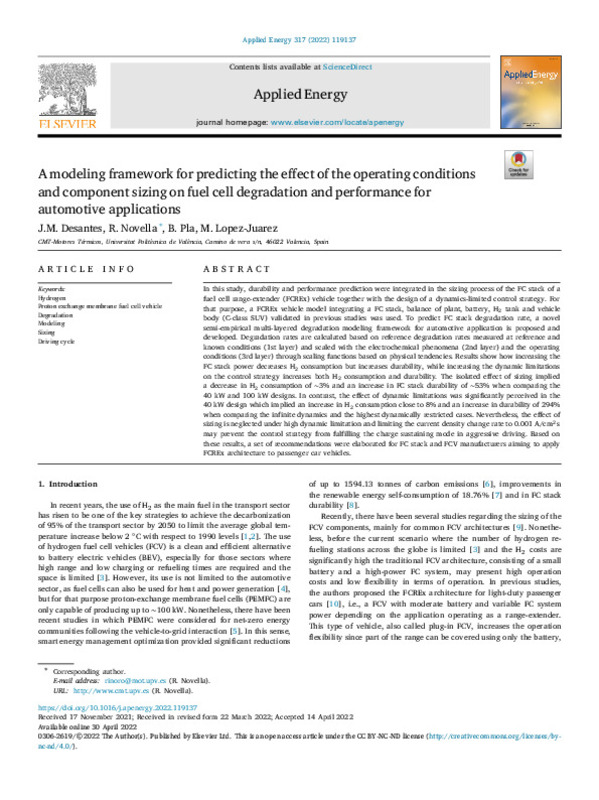JavaScript is disabled for your browser. Some features of this site may not work without it.
Buscar en RiuNet
Listar
Mi cuenta
Estadísticas
Ayuda RiuNet
Admin. UPV
A modeling framework for predicting the effect of the operating conditions and component sizing on fuel cell degradation and performance for automotive applications
Mostrar el registro sencillo del ítem
Ficheros en el ítem
| dc.contributor.author | Desantes J.M.
|
es_ES |
| dc.contributor.author | Novella Rosa, Ricardo
|
es_ES |
| dc.contributor.author | Pla Moreno, Benjamín
|
es_ES |
| dc.contributor.author | López-Juárez, Marcos
|
es_ES |
| dc.date.accessioned | 2023-06-14T18:00:25Z | |
| dc.date.available | 2023-06-14T18:00:25Z | |
| dc.date.issued | 2022-07-01 | es_ES |
| dc.identifier.issn | 0306-2619 | es_ES |
| dc.identifier.uri | http://hdl.handle.net/10251/194222 | |
| dc.description.abstract | [EN] In this study, durability and performance prediction were integrated in the sizing process of the FC stack of a fuel cell range-extender (FCREx) vehicle together with the design of a dynamics-limited control strategy. For that purpose, a FCREx vehicle model integrating a FC stack, balance of plant, battery, H-2 tank and vehicle body (C-class SUV) validated in previous studies was used. To predict FC stack degradation rate, a novel semi-empirical multi-layered degradation modeling framework for automotive application is proposed and developed. Degradation rates are calculated based on reference degradation rates measured at reference and known conditions (1st layer) and scaled with the electrochemical phenomena (2nd layer) and the operating conditions (3rd layer) through scaling functions based on physical tendencies. Results show how increasing the FC stack power decreases H-2 consumption but increases durability, while increasing the dynamic limitations on the control strategy increases both H-2 consumption and durability. The isolated effect of sizing implied a decrease in H-2 consumption of-3% and an increase in FC stack durability of similar to 53% when comparing the 40 kW and 100 kW designs. In contrast, the effect of dynamic limitations was significantly perceived in the 40 kW design which implied an increase in H-2 consumption close to 8% and an increase in durability of 294% when comparing the infinite dynamics and the highest dynamically restricted cases. Nevertheless, the effect of sizing is neglected under high dynamic limitation and limiting the current density change rate to 0.001 A/cm(2) s may prevent the control strategy from fulfilling the charge sustaining mode in aggressive driving. Based on these results, a set of recommendations were elaborated for FC stack and FCV manufacturers aiming to apply FCREx architecture to passenger car vehicles. | es_ES |
| dc.description.sponsorship | This research has been partially funded by the Spanish Ministry of Science, Innovation, and University through the University Faculty Training (FPU) program (FPU19/00550) and FEDER and the Generalitat Valenciana, Consellera dInnovaci, Universitats, Ciencia i Societat Digital through project IDIFEDER/2021/039. | es_ES |
| dc.language | Inglés | es_ES |
| dc.publisher | Elsevier | es_ES |
| dc.relation.ispartof | Applied Energy | es_ES |
| dc.rights | Reconocimiento - No comercial - Sin obra derivada (by-nc-nd) | es_ES |
| dc.subject | Hydrogen | es_ES |
| dc.subject | Proton exchange membrane fuel cell vehicle | es_ES |
| dc.subject | Degradation | es_ES |
| dc.subject | Modeling | es_ES |
| dc.subject | Sizing | es_ES |
| dc.subject | Driving cycle | es_ES |
| dc.subject.classification | MAQUINAS Y MOTORES TERMICOS | es_ES |
| dc.title | A modeling framework for predicting the effect of the operating conditions and component sizing on fuel cell degradation and performance for automotive applications | es_ES |
| dc.type | Artículo | es_ES |
| dc.identifier.doi | 10.1016/j.apenergy.2022.119137 | es_ES |
| dc.relation.projectID | info:eu-repo/grantAgreement/ //FPU19%2F00550//AYUDA PREDOCTORAL FPU-LOPEZ JUAREZ. PROYECTO: ANALYSIS OF THE USE OF HYDROGEN IN POWERPLANTS FOR FUTURE TRANSPORT APPLICATIONS/ | es_ES |
| dc.relation.projectID | info:eu-repo/grantAgreement/GENERALITAT VALENCIANA//IDIFEDER%2F2021%2F039//ANALISIS Y OPTIMIZACION MULTI-ESCALA DE LA ARQUITECTURA DE VEHICULOS DE PILA DE COMBUSTIBLE DE HIDROGENO PARA PROMOVER LA DESCARBONIZACION DEL SECTOR TRANSPORTE/ | es_ES |
| dc.rights.accessRights | Abierto | es_ES |
| dc.contributor.affiliation | Universitat Politècnica de València. Escuela Técnica Superior de Ingeniería del Diseño - Escola Tècnica Superior d'Enginyeria del Disseny | es_ES |
| dc.description.bibliographicCitation | Desantes J.M.; Novella Rosa, R.; Pla Moreno, B.; López-Juárez, M. (2022). A modeling framework for predicting the effect of the operating conditions and component sizing on fuel cell degradation and performance for automotive applications. Applied Energy. 317:1-17. https://doi.org/10.1016/j.apenergy.2022.119137 | es_ES |
| dc.description.accrualMethod | S | es_ES |
| dc.relation.publisherversion | https:doi.org/10.1016/j.apenergy.2022.119137 | es_ES |
| dc.description.upvformatpinicio | 1 | es_ES |
| dc.description.upvformatpfin | 17 | es_ES |
| dc.type.version | info:eu-repo/semantics/publishedVersion | es_ES |
| dc.description.volume | 317 | es_ES |
| dc.relation.pasarela | S\469337 | es_ES |
| dc.contributor.funder | GENERALITAT VALENCIANA | es_ES |
| dc.contributor.funder | MINISTERIO DE UNIVERSIDADES E INVESTIGACION | es_ES |
| dc.contributor.funder | Universitat Politècnica de València | es_ES |








